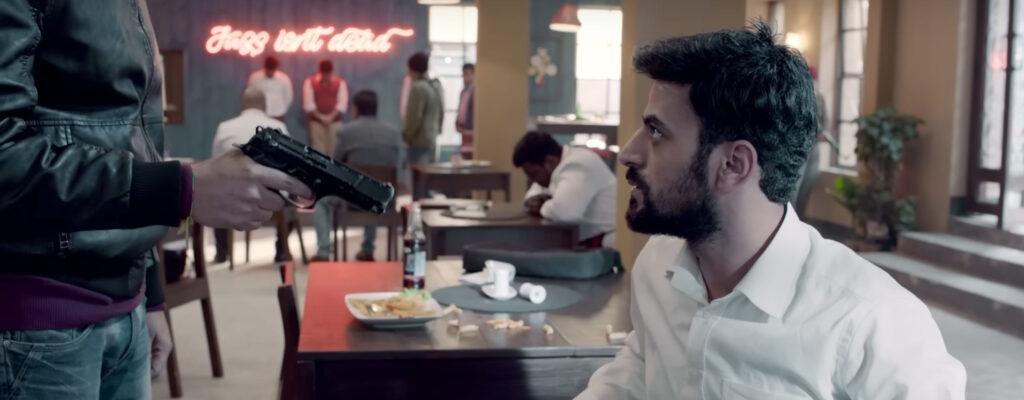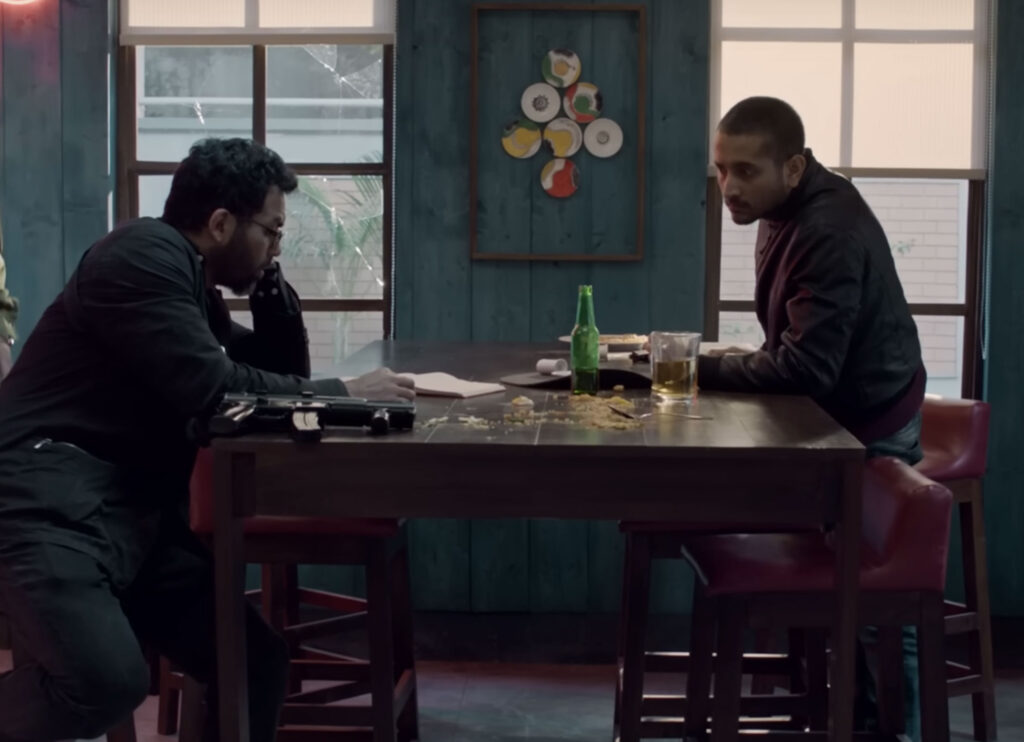Bangladesh, drama, Iresh Zaker, Mamunur Rashid, Masud Rana, Mostofa Sarwar Farooki, movies, Nader Chowdhury, Nusrat Imrose Tisha, Parambrata Chattopadhay, Rahat Rahman, reviews, Saturday Afternoon, Selina Black, Shonibar Bikel, Zahid Hasan
March 15, 2023
by Carla Hay

“Shonibar Bikel (Saturday Afternoon)”
Directed by Mostofa Sarwar Farooki
Bengali with subtitles
Culture Representation: Taking place in Dhaka, Bangladesh, on July 2, 2016, the dramatic film “Shonibar Bikel (Saturday Afternoon)” (based on true events) has a predominantly Asian cast of characters (with a few white people) representing the working-class and middle-class.
Culture Clash: A group terrorists take a restaurant hostage, and they murder people whom they think are not Muslim, not Bangladeshi, or not devout Bangladeshi Muslims.
Culture Audience: “Shonibar Bikel (Saturday Afternoon)” will appeal primarily to people who want to see a dramatic recreation of a real-life tragedy, but the movie does not offer any insightful context and just has scene after scene showing people being shot and killed.

“Shonibar Bikel” is more exploitative than informative. It takes the story of a real-life massacre and uses it as an excuse to show vile murders, without regard to presenting the victims as fully formed people. The movie’s terrible ending has no epilogue.
People who see this movie but who know nothing about the real-life tragedy will be left wondering why they wasted almost 90 minutes of their time watching recreations of senseless murders without learning anything meaningful about the victims, the perpetrators and the people outside the restaurant who were directly involved in the rescue efforts. Law enforcement and media people are barely in the movie and are mostly heard, not seen. And the movie seems to care more about showing how people died than showing who those people really were.
Written and directed by Mostofa Sarwar Farooki, “Shonibar Bikel (Saturday Afternoon)” is about the terrorist attack on the Holey Artisan Bakery restaurant in the Gulshan Thana district of Dhaka, Bangladesh. Five terrorists took the restaurant hostage, beginning on the night of July 1, 2016, with the massacre ending during the day on July 2, 2016. In total, 29 people were killed: 20 hostages, two police officers, two restaurant staffers who tried to escape and the five terrorists.
“Shonibar Bikel (Saturday Afternoon)” is a recreation of the Saturday afternoon of the massacre. This movie shows only what happens in the restaurant, not the rescue efforts outside. Therefore, the movie literally just shows nothing but repetitive scenes of the terrorists interrogating the hostages and then killing many of them. In real life, the terrorists went into the restaurant with bombs, machetes and guns and used all of these weapons during this hostage crisis and massacre. In “Shonibar Bikel (Saturday Afternoon),” there is an unrealistic fixation on the terrorists just using guns.
The reason for the hostage interrogations is because the terrorists want to find out which hostages meet the terrorists’ standards of being religious Bangladeshi Muslims. Anyone who isn’t a Muslim is automatically murdered. Anyone whose nationality isn’t Bangladeshi is automatically murdered. And if a hostage is a Bangladeshi Muslim, the hostage goes through rigorous questioning, scrutiny and extreme judgments. For example, if someone is Muslim but wearing what the terrorists call “Western clothing,” such as jeans, the terrorists will probably murder that person.
A male hostage who isn’t macho can be killed because he’s considered “not Muslim enough.” A female hostage who is confident or independent can be killed because she’s considered “not Muslim enough.” One of the terrorists calls a woman a “bitch” because she is not wearing a hijab. You can easily predict what happens to her. An unnamed pregnant woman (played by Selina Black), who is gunned down by a terrorist after he tells her she can leave, is murdered just because she is white and from a Western country.
These repetitive murders go on and on for the entire movie, with no effort to explain the backgrounds of any of the people involved. People watching this movie already know that these mass-murder tragedies are senseless. But people watch movies like this to find out more about who were some of the people who tragically lost their lives and what was going on with law enforcement to help save them. “Shonibar Bikel (Saturday Afternoon)” doesn’t care to tell any of those stories at all. It’s just a mindless recreation of a massacre.
Some people who praise this movie might be enthralled by the cinematography. “Shonibar Bikel (Saturday Afternoon)” was made to look like it was all filmed in “real time” with no editing. Just because some of the cinematography is artsy doesn’t mean it’s a good film. The visual aspects of the camera work are very superficial distractions, because “Shonibar Bikel (Saturday Afternoon)” lacks a substantial narrative.
Don’t expect to learn much about the hostages who get most of the screen time in “Shonibar Bikel (Saturday Afternoon).” Nader Chowdhury, who portrays a character named after himself, has the role of a father who begs the terrorists to let his son (who’s about 7 or 8 years old) leave the restaurant safely. A man named Sahidul (played by Zahid Hasan) is a hostage who tries to be a peacemaker. Another man named Mozammel Haque (played by Mamunur Rashid) attempts to convince the terrorists that he’s Bangladeshi, not Indian.
Masud Rana plays a character named after himself. The character is an elderly man who recognizes one of the terrorists as someone who used to go to the same school as his son. “What made you a killer?” Masud tearfully asks. “Where did we fail you?” The terrorist doesn’t answer. Instead, there’s just a closeup of a burning cigarette being held by the terrorist, and the camera stays on the cigarette until a long strip of ash at the end falls off the cigarette. It’s all just pretentious filmmaking.
Another hostage is a 26-year-old woman named Raisa (played by Nusrat Imrose Tisha), who gets a hard time from the terrorists because she’s an unmarried woman who works outside the home. The only reason why Raisa isn’t murdered right away is because she’s earing a hijab. One of the terrorists tells her that the only good Muslim females are the ones who are married by age 15, a mother by age 16, and dedicated to spending rest of their lives serving their families.
Raisa has to explain why she works outside the home (she will only say she works for a “private company”), and she says it’s because she has to help financially support her family members. When the terrorists further berate Raisa for not being married at her age, a man steps forward and identifies himself as Raisa’s fiancé (played by Rahat Rahman), but he gets verbally abused for not being “man enough” to defend Raisa earlier.
The terrorists force Raisa to call her mother to relay messages to the police. Raisa, who is very outspoken, quickly gets tired of the terrorists using her mother as a pawn, and she demands that they stop. “Stop disrespecting my mother!” she shouts at a terrorist. “Kill me if you want, but don’t disrespect my mother anymore!” There’s no surprise when viewers see what happens to Raisa.
“Shonibar Bikel (Saturday Afternoon)” is the second movie released in 2023 about this real-life tragedy. It follows the release of the drama “Faraaz,” a much better film that looks at the humanity of some of the victims and their families, in addition to giving a better context of why this tragedy happened. In “Faraaz,” all of the terrorists were depicted as impressionable young men in their late teens and 20s. And it’s explained in “Faraaz” that they instigated this attack at the urging of an older mentor who taught them how to become radical Islamic terrorists. In “Faraaz,” one of the hostages recognizes one of the terrorists as someone who is a former schoolmate and who was on the same soccer team. It’s a compelling core of the movie.
In “Shonibar Bikel (Saturday Afternoon),” almost all of the terrorists are depicted as men in their 30s and 40s, with no context given for who they are and why they ended up becoming ruthless murderers. All of the terrorists in “Shonibar Bikel (Saturday Afternoon)” are extremely generic. The terrorists’ leader inside the restaurant is a bespectacled killer named Ibtesham (played Iresh Zaker), who is depicted as the most unpredictable “loose cannon” in the group. Another terrorist named Polash (played by Parambrata Chattopadhay) is an obedient subordinate who is calm, calculating and cold-blooded.
“Shonibar Bikel (Saturday Afternoon)” might be overrated by some people because the movie made the rounds at several high-profile film festivals in 2019, including the Moscow International Film Festival and the Sydney Film Festival. “Shonibar Bikel (Saturday Afternoon)” became controversial because the Bangladesh government banned the movie from being released. The ban was lifted in January 2023.
But just because a movie was at several film festivals, and just because some people think a banned film automatically makes it worth seeing, doesn’t make it a meaningful film that’s worthy of a viewer’s time. Simply put: The very tacky and soulless “Shonibar Bikel (Saturday Afternoon)” is the scripted drama equivalent of a snuff film.
Jaaz Multimedia released “Shonibar Bikel (Saturday Afternoon)” in select U.S. cinemas on March 10, 2023.
